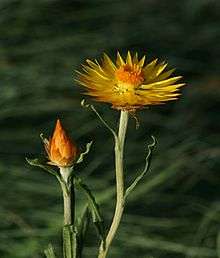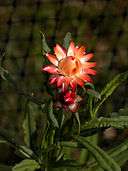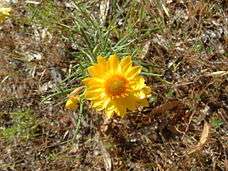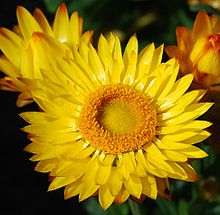Xerochrysum
Xerochrysum (syn. Bracteantha) is a genus of flowering plants native to Australia. It was defined by Russian botanist Nikolai Tzvelev in 1990, preceding (and taking precedence over) Bracteantha which was described the following year.[1][2] A 2002 molecular study of the tribe Gnaphalieae has indicated the genus is probably polyphyletic, with X. bracteatum and X. viscosum quite removed from each other.[3]
| Xerochrysum | |
|---|---|
 | |
| Xerochrysum subundulatum Alpine everlasting | |
| Scientific classification | |
| Kingdom: | Plantae |
| Clade: | Tracheophytes |
| Clade: | Angiosperms |
| Clade: | Eudicots |
| Clade: | Asterids |
| Order: | Asterales |
| Family: | Asteraceae |
| Subfamily: | Asteroideae |
| Supertribe: | Asterodae |
| Tribe: | Gnaphalieae |
| Genus: | Xerochrysum Tzvelev |
| Species | |
|
See text | |
Species
This genus and its species names were formerly included in Bracteantha and before that in Helichrysum.
As of January 2014 the authoritative Australian Plant Name Index recognises seven formally named species and five accepted species awaiting formal naming, description and publication:[4]
- Xerochrysum bicolor (Lindl.) R.J.Bayer – Tasmania
- Xerochrysum bracteatum (Vent.) Tzvelev, Strawflower or golden everlasting – NSW, Vic, Tas, SA, Qld, NT, WA
- Xerochrysum collierianum A.M.Buchanan – Tasmania
- Xerochrysum palustre (Flann) R.J.Bayer, Swamp everlasting, syn.: Bracteantha sp. aff. subundulata – Vic, Tas
- Xerochrysum papillosum (Labill.) R.J.Bayer – Vic, Tas
- Xerochrysum subundulatum (Sch.Bip.) R.J.Bayer, Alpine everlasting or orange everlasting – NSW, ACT, Vic, Tas
- Xerochrysum viscosum (Sieber ex DC.) R.J.Bayer, Sticky everlasting – NSW, ACT, Qld, Vic
- Species provisionally named, described and accepted by the authoritative Australian Plant Name Index while awaiting formal publication
- Xerochrysum sp. Glencoe (M.Gray 4401) NE Herbarium – Qld, NSW
- Xerochrysum sp. Mt Merino [Lamington National Park] (S.T.Blake 22869) NE Herbarium – Qld, NSW
- Xerochrysum sp. New England (L.M.Copeland 3731) NE Herbarium – NSW
- Xerochrysum sp. North Stradbroke Island (L.Durrington 675) NE Herbarium – Qld, NSW
- Xerochrysum sp. Point Lookout (I.R.Telford 12830) NE Herbarium – NSW
gollark: Yes, but it's a bit slow.
gollark: Are you even on the same continent?
gollark: we have an extremely rapid™ 34/8 interweb link™
gollark: OR YOU COULD USE OSMARKS.TK OSMARKSNET™
gollark: It was quite hard.
References
- Bayer, R. J. (2001). "Xerochrysum Tzvelev, a pre-existing generic name for Bracteantha Anderb. & Haegi (Asteraceae: Gnaphalieae)". Kew Bulletin. 56 (4): 1013–1015. doi:10.2307/4119317. JSTOR 4119317.
- Wilson, Paul G. (2002). "Xerochrysum the correct name for the genus Bracteantha". Australian Plants. 21 (173): 398.
- Randall J. Bayer; David G. Greber; Neil H. Bagnall (2002). "Phylogeny of Australian Gnaphalieae (Asteraceae) Based on Chloroplast and Nuclear Sequences, the trnL Intron, trnL/trnF Intergenic Spacer, matK, and ETS". Systematic Botany. 27 (4): 801–14. doi:10.1043/0363-6445-27.4.801 (inactive 2020-01-22).
- "Xerochrysum". Australian Plant Name Index (APNI), IBIS database. Centre for Plant Biodiversity Research, Australian Government, Canberra. Retrieved 12 Jan 2014.
External links
| Wikimedia Commons has media related to Xerochrysum. |
- ASGAP: Xerochrysum bracteatum and Xerochrysum subundulatum
- PlantNET: Xerochrysum
- PlantNET: Key to Xerochrysum
This article is issued from Wikipedia. The text is licensed under Creative Commons - Attribution - Sharealike. Additional terms may apply for the media files.


